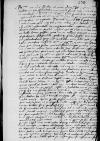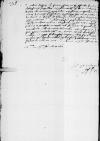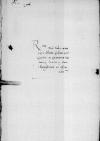Letter #1720
Ioannes DANTISCUS to Tiedemann GIESELöbau (Lubawa), 1537-09-23
English register: Dantiscus is replying to two letters from Giese. He is pleased that matters have turned out well and proposes that he and Giese meet as soon as possible, to prepare the documents to be sent to Rome. The rough drafts of these documents will be sent to the Cracow bishop (Grand Chancellor Jan Chojeński) and then, after their elaboration and necessary additions (at the royal chancellery), sent back to Dantiscus. They will then decide together what means to use to send them to Rome. Dantiscus will write to the Cracow bishop asking that the king issue a new document appointing Giese to the office of Chełmno bishop, but nevertheless asks Giese to send him the original of the old one, so that he can show it to the Chełmno Chapter and the diocese’s residents. He encourages Giese to stay cheerful – he thinks the matter (of the appointment) is all arranged. Dantiscus thanks Giese whole-heartedly for his great hospitality towards Mikołaj Nipszyc, in whom Giese has gained a faithful friend. In this way, taking the place of the deceased Jan Zambocki, Giese is restoring the old triumvirate of friends (Dantiscus, Nipszyc, Giese). Dantiscus informs Giese that he has written to warn the fool (Paweł Płotowski?) not to get too bold towards the king.
Manuscript sources:
Prints:
| ||||||||||||||||||
Text & apparatus & commentary Plain text Text & commentary Text & apparatus Excerpts concerning Dantiscus' travels
Reverendissimo Domino
Reverendissime mi Domine, Frater et Amice carissime et observandissime. Salutem cum omnis felicitatis incremento fraternique amoris mei commendatione.
Binis Dominationis Vestrae Reverendissimae litteris, quas heri accepi, respondebo, communi cum Dominatione Vestra Reverendissima laeticia et hospitalitate occupatus, in compendio. Primum omnium Deo Omnipotenti laus, honor, gloria atque omnis graciarum actio, qui secundum suam clementem voluntatem ac misericordiam
cf. Ter. Ad. 480 nunc huius periclo fit, ego in portu navigo; Adagia 1526 No. 46 In portu navigare ⌊negotia nostra perduxit salva in portumcf. Ter. Ad. 480 nunc huius periclo fit, ego in portu navigo; Adagia 1526 No. 46 In portu navigare ⌋. Nostrum igitur iam erit curare, ut
cf. Rhet. Her. 3. 8. 22-24 virtutibus uti neminem posse, qui suas rationes in tuto non conlocarit: ne deos quidem esse auxilio is, qui se inconsulto in periculum mittant ⌊in tuto locaricf. Rhet. Her. 3. 8. 22-24 virtutibus uti neminem posse, qui suas rationes in tuto non conlocarit: ne deos quidem esse auxilio is, qui se inconsulto in periculum mittant ⌋ possint. Qua in re nullam patiar a me desiderari diligentiam, gratiamque, quantum possum, pro cura ac solicitudine pro me habita non solum agam, sed totis viribus referam Dominationi Vestrae Reverendissimae. Quam impense oro, sive
Quod Dominatio Vestra Reverendissima scribit de consensu
Non potui mihi temperare, quin hominis idiotae et stupidi, cuius me revera miseret, tantum abest ut indigner, fatuas et impudentes litteras <Reverendissimae Dominationi Vestrae mitterem>. Quibus se nescio quem principem scribit fuisse
Dominationis Vestrae Reverendissimae frater integerrimus
[2 ] vapularet tribus more Hunnorum fustibus cf. Andreas Dudithius à Péter Méliusz: Tribus fustibus, ut more patrio loquar, quam responso ullo alio dignior es (Dudithius, p. 319, letter 270).


